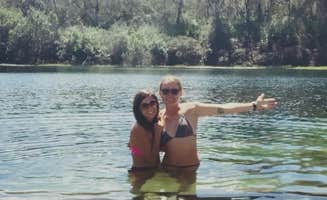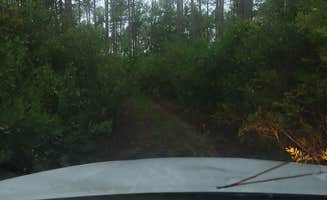Dispersed camping near Longwood, Florida concentrates primarily within Ocala National Forest, where seasonal conditions significantly impact camping experiences. Florida's subtropical climate creates distinct wet and dry seasons, with summer thunderstorms from June through September often flooding forest roads and campsites. Winter months (November-February) provide drier conditions with temperatures averaging 50-70°F, making primitive camping more accessible when many roads become passable for standard vehicles.
What to do
Swimming opportunities: Blue Sink offers a natural swimming hole for cooling off during hot Florida days. According to one visitor, it's the "most beautiful place to stumble upon," though access now requires "ATV or creative backpacking" since the Forest Service restricted easy road entry.
Kayaking and fishing: The dispersed areas near Freak Creek Dispersed Camping provide water access. One camper notes it's a "great place to put a kayak in the water" with fishing opportunities for those who bring appropriate gear.
Wildlife observation: Dawn and dusk offer prime wildlife viewing hours. One camper mentioned potential panther sightings: "I talked to another person that use to go out there and said she has seen a panther. I've yet to see anything." Bringing binoculars improves chances of spotting native Florida wildlife.
What campers like
Seclusion factor: Many dispersed sites offer genuine isolation from crowds and noise. A camper at Trout Lake Primitive Sites describes "nice secluded sites" near the lake with limited visitor traffic.
Stargazing conditions: Clear night skies reward campers at St. Johns River Dispersed Spot where "the roads to get here are bumpy. Right next to the river and the trees open up so you get a great view of the stars."
Limited capacity means privacy: Most sites accommodate only a handful of camping groups simultaneously. Freak Creek Dispersed Camping remains particularly uncrowded as "not many ppl visit due to not being able to get back," according to a recent visitor.
What you should know
Vehicle requirements: Many sites demand high-clearance 4WD vehicles. At Trout Lake Primitive Sites, the "main road entry is packed dirt; smaller access road to sites is two-track about 1/4 mile through woods — very narrow tree clearance. 4WD recommended."
Safety considerations: Some areas have security concerns. One camper explicitly warns against Lake Dorr: "Attempted to stay at this campground but left because it felt unsafe. Spoke to a local that warned of violence, robbery, and killings in this area of the national forest."
Communication limitations: Cell service ranges from poor to nonexistent. A Trout Lake visitor reported "poor cell service even with booster. Plan on returning after antenna upgrade." Bring alternative communication devices for emergencies.
Sand hazards: Florida's sandy soil creates vehicle entrapment risks. One Lake Dorr visitor "got stuck in sand on the way out and had to wait for a tow truck." Bring recovery boards and shovels when accessing remote sites.
Tips for camping with families
Preparation essentials: Pack extra drinking water, insect repellent, and sun protection. The primitive nature of these sites requires complete self-sufficiency.
Site selection priorities: Choose locations with natural boundaries like fallen trees or clearings to help contain children. Freak Creek offers sites that are "super secluded and quiet" but visitors should know that "depending when you stay there's at times people who show up to party and then leave."
Entertainment planning: Bring water toys for creek areas. At Freak Creek, "there is a nice creek area where you can swim and or fish if you have the right equipment to get back there it can be fun."
Tips from RVers
Size restrictions: Small trailers or truck campers only. According to one Freak Creek camper, "I would not attempt bringing a camper unless it's really small."
Vehicle clearance concerns: Expect tree damage on narrow access roads. At Trout Lake Primitive Sites, roads have "very narrow tree clearance" and visitors warn "you will leave with some new pinstripes."
Alternative parking strategy: One RVer barely accessed a site with a Promaster van, reporting they "just barely scraped a FWD Promaster through the trees, into a pullout just before sand started." Consider parking at wider road sections and walking gear into tighter sites.



